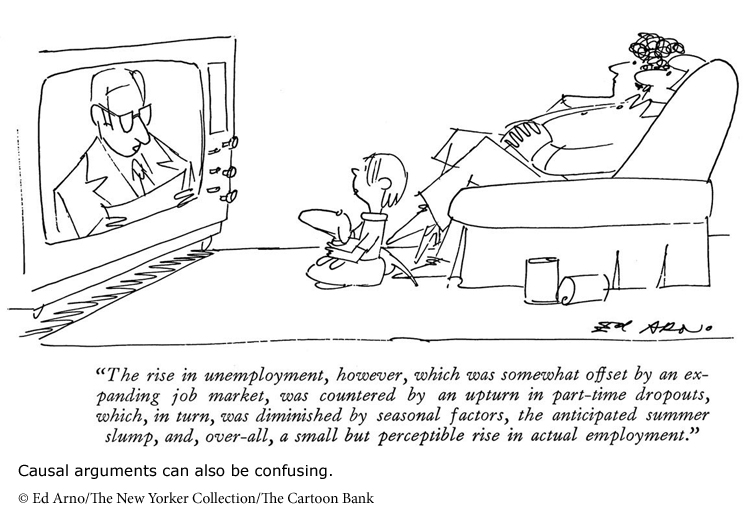Characterizing Causal Arguments
Characterizing Causal Arguments
Causal arguments tend to share several characteristics.
They Are Often Part of Other Arguments
Many stand-alone causal arguments address questions that are fundamental to our well-being: Why are juvenile asthma and diabetes increasing so dramatically in the United States? What are the causes of the rise in cases of malaria in Africa, and what can we do to counter this rise? What will happen to Europe if its birthrate continues to decline?
But causal analyses often work to support other arguments — especially proposals. For example, a proposal to limit the time that children spend playing video games might first draw on a causal analysis to establish that playing video games can have bad results — such as violent behavior, short attention spans, and decreased social skills. The causal analysis provides a rationale that motivates the proposal. In this way, causal analyses can be useful in establishing good reasons for arguments in general.
They Are Almost Always Complex
The complexity of most causal relationships makes it difficult to establish causes and effects. For example, in 2011 researchers at Northwestern University reported a startling correlation: youths who participated in church activities were far more likely to grow into obese adults than their counterparts who were not engaged in religious activities. How does one even begin to explain such a peculiar and unexpected finding? Too many church socials? Unhealthy food at potluck meals? More regular social engagement? Perhaps.
Or consider the complexity of analyzing the causes of food poisoning when they strike large populations: in 2008, investigators spent months trying to discover whether tomatoes, cilantro, or jalapeño peppers were the cause of a nationwide outbreak of salmonella. More than seventeen states were affected. But despite such challenges, whenever it is possible to demonstrate convincing causal connections between X and Y, we gain important knowledge and powerful arguments. That’s why, for example, great effort went into establishing an indisputable link between smoking and lung cancer. Once proven, decisive legal action could finally be taken to warn smokers.
They Are Often Definition Based
One reason that causal arguments are complex is that they often depend on careful definitions. Recent figures from the U.S. Department of Education, for example, show that the number of high school dropouts is rising and that this rise has caused an increase in youth unemployment. But exactly how does the study define dropout? A closer look may suggest that some students (perhaps a lot) who drop out later “drop back in” and complete high school or that some who drop out become successful entrepreneurs or business owners. Further, how does the study define employment? Until you can provide definitions for all key terms in a causal claim, you should proceed cautiously with your argument.

They Usually Yield Probable Rather Than Absolute Conclusions
Because causal relationships are almost always complex or subtle, they seldom can yield more than a high degree of probability. Consequently, they are almost always subject to criticism or open to charges of false causality. (We all know smokers who defy the odds to live long, cancer-free lives.) Scientists in particular are wary when making causal claims.
After exploring the effects of the mobile supermarket in an urban setting, Katherine Gustafson concludes that these markets aren’t likely to be the best method of getting sustainable, affordable food into cities.
Even after an event, proving precisely what caused it can be hard. During the student riots of the late 1960s, for example, a commission was charged with determining the causes of riots on a particular campus. After two years of work and almost a thousand pages of evidence and reports, the commission was unable to pinpoint anything but a broad network of contributing causes and related conditions. And how many years is it likely to take to unravel all the factors responsible for the extended recession and economic decline in the United States that began in 2008? After all, serious scholars are still arguing about the forces responsible for the Great Depression of 1929.
To demonstrate that X caused Y, you must find the strongest possible evidence and subject it to the toughest scrutiny. But a causal argument doesn’t fail just because you can’t find a single compelling cause. In fact, causal arguments are often most effective when they help readers appreciate how tangled our lives and landscapes really are.